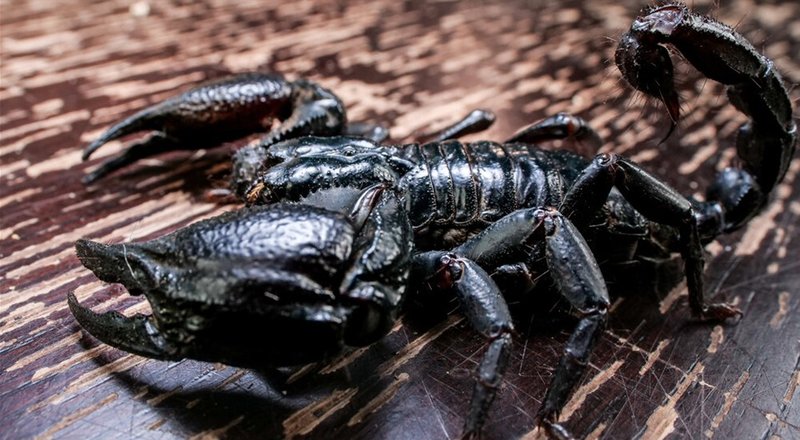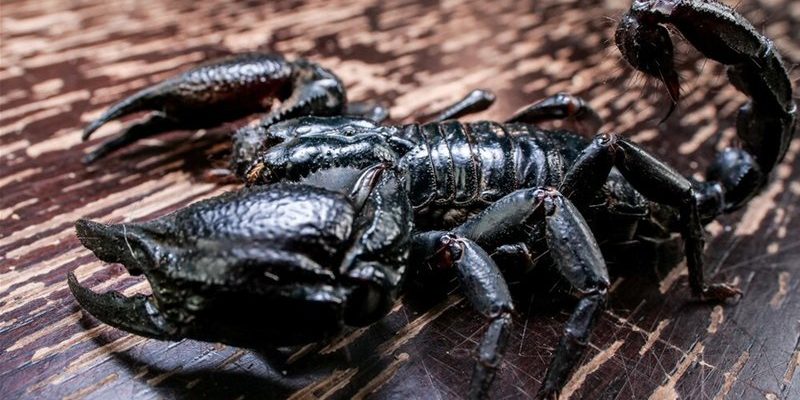
Imagine sitting with a friend at a café, sipping your favorite drink, and casually chatting about these creepy crawlies. You might wonder, “Can I get hurt if I encounter one of these?” or “What should I know before stepping into their territory?” Understanding how these scorpions function in their environment, including their venom and behavior, is vital for anyone curious about them. Let’s take a closer look at what makes the Asian Forest Scorpion unique and whether it poses any real threat to humans.
What is the Asian Forest Scorpion?
The Asian Forest Scorpion (Heterometrus spp.) is one of the most commonly found scorpions in the jungles of Southeast Asia. These critters can grow up to about 8 inches long and often sport a shiny black or dark brown exoskeleton that helps them blend into the damp forest floor. With their large pincers and long tails, they can look pretty intimidating, but there’s a lot more to them than meets the eye.
You might be wondering about their habitat. Well, these scorpions love to hang out in moist environments, often hiding under rocks, logs, or leaf litter during the day. They’re nocturnal, meaning they come alive at night, hunting for insects and small invertebrates. Think of them as the nighttime cleanup crew of the jungle, helping to keep the ecosystem in balance.
Are Asian Forest Scorpions Poisonous?
The short answer is yes, Asian Forest Scorpions are indeed venomous, but they’re not considered dangerous to humans. The venom they possess is primarily used to subdue prey. It can deter predators and capture insects, but it’s not powerful enough to cause severe harm to people. If you’ve ever been stung by a bee, the pain may feel somewhat similar, but it’s usually manageable with basic first aid.
Here’s the thing: the toxicity of their venom is relatively low compared to other species, like the infamous Brazilian Yellow Scorpion. Even a sting from an Asian Forest Scorpion might cause only minor irritation, leading to localized pain, swelling, and redness. If you’re lucky, you might not even feel anything at all!
What Happens If You Get Stung?
So, what if you do get stung by an Asian Forest Scorpion? While it’s a rare occurrence, especially if you’re cautious, it’s good to know what to expect. Most stings result in mild symptoms that can include:
- Localized Pain: This can feel sharp at first and then turn into a dull ache.
- Swelling and Redness: You might notice some puffiness around the sting site.
- Nausea or Sweating: In a few cases, people might experience light nausea or increased sweating.
Although a sting isn’t life-threatening, it’s essential to keep an eye on the symptoms. In very rare instances, individuals may have allergic reactions, which can escalate into more serious issues. If you experience difficulty breathing, rapid heartbeat, or swelling beyond the sting site, it’s crucial to seek medical attention immediately.
How to Treat a Scorpion Sting
If you ever find yourself on the receiving end of an Asian Forest Scorpion sting, don’t panic. Here’s a simple step-by-step guide to help ease your discomfort:
1. Stay Calm: Take a deep breath. Most stings aren’t serious.
2. Clean the Area: Wash the sting site with soap and water to reduce the risk of infection.
3. Apply a Cold Compress: This can help numb the area and reduce swelling. Just don’t apply ice directly to the skin.
4. Take Pain Relievers: Over-the-counter medications like ibuprofen or acetaminophen can help manage pain.
5. Monitor Your Symptoms: Keep track of how you’re feeling. If anything worsens, reach out to a healthcare professional.
How to Avoid Getting Stung
Prevention is always better than cure, right? Here are some tips to steer clear of an unwanted sting from an Asian Forest Scorpion.
– Wear Protective Clothing: If you’re exploring their habitat, consider sturdy shoes and long pants. It’s like wearing armor in unfamiliar territory.
– Watch Where You Step: Be mindful of where you place your hands and feet, especially under rocks or logs. This will help you avoid unexpected encounters.
– Use a Flashlight at Night: Since these critters are nocturnal, using a flashlight can help you spot them before you get too close.
– Keep Your Environment Tidy: If you live in an area where these scorpions are found, clearing debris around your home can discourage them from setting up camp nearby.
Comparing Asian Forest Scorpions to Other Scorpions
When discussing scorpions, it’s interesting to note how many different types there are. For instance, take the Brazilian Yellow Scorpion—one of the most venomous species. Unlike the Asian Forest Scorpion, their sting can be deadly, especially to young children or individuals with compromised immune systems.
In contrast, the Asian Forest Scorpion is generally considered less risky, making it quite popular in the pet trade. They’re often sold as exotic pets due to their striking appearance and relatively calm demeanor, which makes them easier to handle.
If you’re weighing whether to keep a scorpion as a pet, consider the differences between species. Understanding which ones are more venomous and how their care differs can help you make an informed decision.
So, is the Asian Forest Scorpion poisonous or dangerous? While they do have venom, they’re not generally a threat to humans, making them more fascinating than fearsome. They play a crucial role in their ecosystem and, with proper precautions, you can enjoy the beauty of their habitat without worry.
If you ever encounter one, just remember to respect their space and be cautious. After all, they’re just doing their job in the wild, much like us trying to navigate through life. With this newfound knowledge, you can appreciate these remarkable creatures even more while staying safe. Whether you’re exploring the jungles of Asia or simply learning from afar, understanding these unique scorpions can enrich your curiosity about the animal kingdom.

